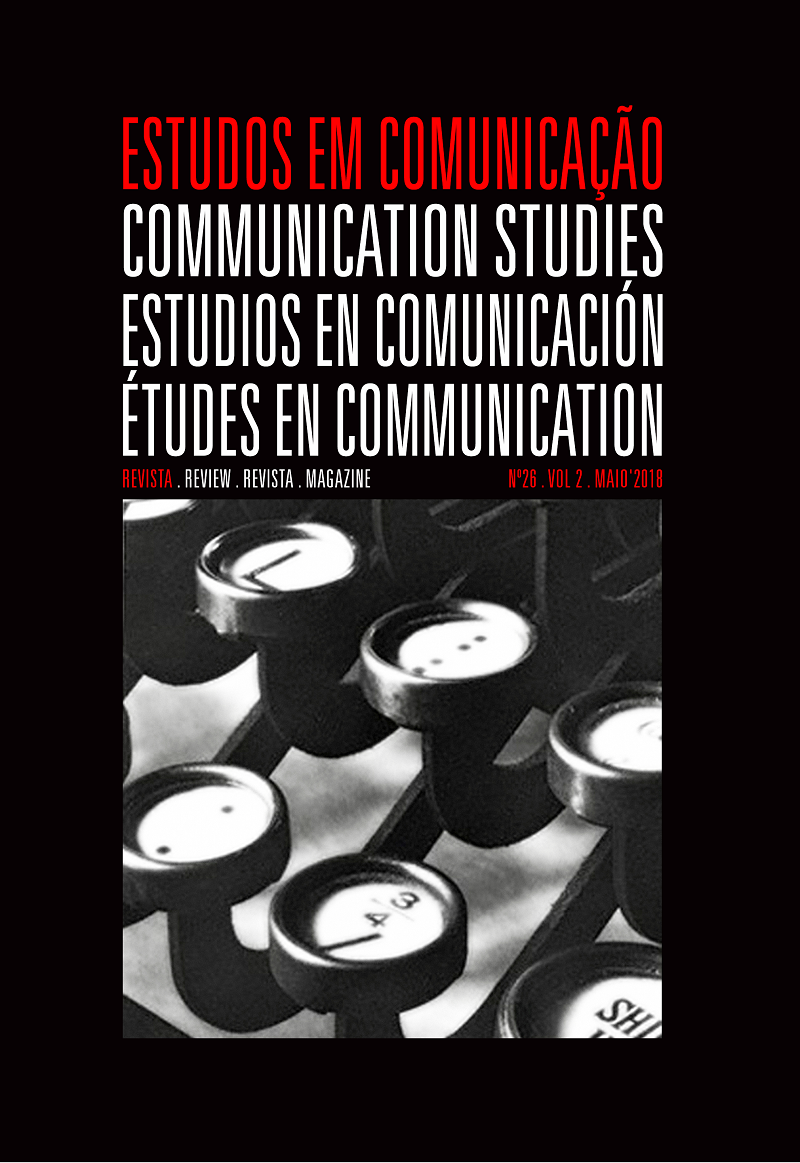Bolhas de verdade: cinco alfinetes para (re)construir a democracia
Palavras-chave:
pós-verdade, distopias, pós-modernidade, populismo.Resumo
No nosso artigo procuramos refletir sobre as implicações que o termo “pós-verdade” tem como forma de caracterizar as nossas sociedades com um mal- estar mediático, cultural, social e político. Consideramos que a importante investigação que se tem produzido sobre o tema e que o liga à cultura mediática deve alargar o seu âmbito para além dos media se queremos compreender o avanço sem precedentes do populismo e das suas fórmulas que dão sustentação aos movimentos de ultra-direita que ressurgem nos nossos horizontes democráticos. Para o efeito, consideramos cinco elementos – a que chamamos bolhas de verdade – para sinalizar algumas perspetivas que consideramos críticas sobre o que está em causa nesta problemática.
Referências
Alvares, C. & Dahlgren, P. (2016). Populism, extremism and media: mapping an uncertain terrain. European Journal of Communication, 31(1), 46-57.
Atwood, M. (1985/2013). The handmaid’s tale. (trad. para língua portuguesa como A História de Uma Serva, ed. Bertrand). Toronto: Seal.
Baudrillard, J. (1991/1981). Simulacros e simulação. Lisboa: Relógio D’água.
Bauman, Z. (1999). Modernidade e ambivalência. Rio de Janeiro: Zahar.
Fallows, J. (2012). Bit by bit it takes shape: media evolution for the ‘post-truth’ Age. The Atlantic, Setembro, (4).
Fallows, J. (2017). With such a people you can then do what you please. The Atlantic, Fevereiro (21).
Foucault, M. (1976/2000). Truth and power. In J. D. Faubion (ed.), Power: essential works of Foucault, 1954-1984, vol. 3 (pp. 111-133). New York, NY: New Press.
Fraser, N. (2016). Progressive neoliberalism versus reactionary populism: a choice that feminists should refuse. NORA – Nordic Journal of Feminist and Gender Research, 24(4), 281-284.
Garcia, J. L. (2016). Introduction: towards a critical philosophy of networks – reflections on the perspective of Pierre Musso. In J. L. Garcia (org.), Pierre Musso and the network society. From Saint-Simonianism to the Internet. Springer.
Habermas, J. (1981). Modernity versus postmodernity. New German Critique, (22), 3-14.
Habermas, J. (2006). Political communication in media society: does democracy still enjoy an epistemic dimension? The impact of normative theory on empirical research”. Communication Theory, 16(4), 411-426.
Habermas, J. (2007). How to save the quality press?. Süddeutsche Zeitung, 16 May, (trad. para inglês disponível em: www.signandsight.com/features/1349.html)
Howell, E. H. (2009). Constructions and reconstructions: feminism, postmodernism, and the handmaid’s tale. Concept, [S.l.], 33.
Inglehart, R. & Norris, P. (2017). Trump and the xenophobic populist parties: the silent revolution in reverse. Perspectives on Politics, 15(2), 443-454.
Lyotard, J.-F. (1989). A Condição Pós-Moderna. Lisboa: Gradiva.
Milton, J. (1644/2009). Areopagítica. Discurso sobre a liberdade de expressão. Edições Almedina.
Musso, P. (2006). Ciberespaço, figura reticular da utopia tecnológica. In D. Moraes (org.), Sociedade midiatizada. Rio de Janeiro: Mauad.
Musso, P. (2016). Network ideology: from saint-simonianism to the internet. In J. L. Garcia (org.), Pierre Musso and the Network society from Saint-Simonianism to the Internet. Springer. Neuman, S. (2006). ‘Just a Backlash’: Margaret Atwood, feminism, and the handmaid’s tale. University of Toronto Quarterly, 75(3), 857-868.
Pariser, E. (2011). The filter bubble: how the new personalized web is changing what we read and how we think. Penguin Books.
Postman, A. (2017). My dad predicted Trump in 1985 – it’s not Orwell, he warned, it’s Brave New World. The Guardian, 2 fevereiro 2017.
Postman, N. (2005). Amusing ourselves to death: public discourse in the age of show business. 20 anv. ed. New York: Penguin.
Stein, K. (2001). Margaret Atwood’s modest proposal: the handmaid’s tale. In H. Bloom (ed.), Margaret Atwood’s the handmaid’s tale (pp. 127-140). Broomall: Chelsea House Publishers.
Sunstein, C. R. (2001). Republic.com. Princeton, NJ: Princeton University Press.
Susen, S. (2015). The ‘postmodern turn’ in the social sciences. New York: Palgrave Macmillan.
Therborn, G. (2003). Entangled modernities. European Journal of Social Theory, 6(3), 293-305.
Tolan, F. (2007). Margaret Atwood: feminism and fiction. Amsterdam: Rodopi.


